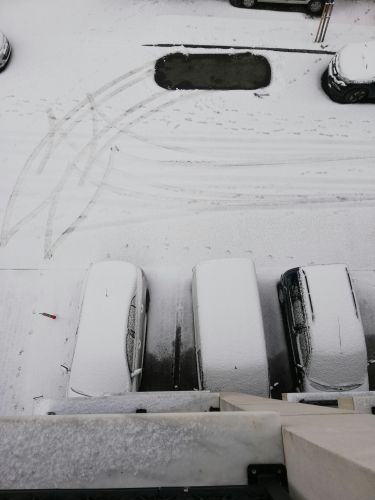



Drivers understand that even a thin layer of black ice can be more dangerous than several inches of snow. The Fourth Circuit’s recent decision in Brown v. Wal-Mart Stores E., LP, No. 24-1102, 2025 U.S. App. LEXIS 13655 (4th Cir. June 4, 2025), underscores that businesses, too, must remain alert to the hazards posed by black ice.
In Brown, the United States Court of Appeals for the Fourth Circuit reversed an order granting summary judgment to Wal-Mart on claims arising from a customer’s slip and fall in a parking lot after a winter storm. The storm passed through Lynchburg, Virginia overnight and dropped around 2.5 inches of snow. Early the next morning, Lois Brown drove to a Wal-Mart store and pulled in the parking lot, where she noticed the pavement was wet but did not see any hazards. However, she immediately slipped and fell on a patch of black ice while getting out of her vehicle.
The plaintiff filed a lawsuit alleging that Wal-Mart was negligent by not maintaining its parking lot in a safe condition. The United States District Court for the Western District of Virginia granted Wal-Mart’s motion for summary judgment, holding that Wal-Mart was entitled to summary judgment under Virginia premises liability law on two grounds. First, the district court held that the plaintiff failed to produce evidence showing Wal-Mart had actual notice or constructive notice of the black ice she slipped on. The district court reasoned that to establish notice, the plaintiff needed to show that Wal-Mart knew about the specific patch of ice that she slipped on, as well as when that specific patch of ice had formed. Second, the district court held that the plaintiff failed to produce evidence showing that Wal-Mart, which employed a contractor to remove ice and snow from its parking lot, breached its duty of care.
The Fourth Circuit reversed on both grounds. With respect to notice, the Fourth Circuit held that the district court erred by finding that the plaintiff was required to show that Wal-Mart had actual notice or constructive notice of the specific patch of black ice she slipped on. Instead, the Fourth Circuit reasoned that under Virginia law, “the snowstorm itself provided Wal-Mart with notice of the ice and snow in the entire parking lot all at once.” The Fourth Circuit explained this is because “[b]y its plain terms, the duty to use reasonable care to remove ice and snow after a storm doesn’t apply to specific patches of ground. Rather, it applies to all of a business’s ‘outdoor areas’ all at once.” The Fourth Circuit further explained that “[t]his kind of generalized notice is unique to inclement-weather premises-liability cases,” and contrasted inclement-weather cases with “one-off hazards in other premises-liability cases,” such as when a customer trips over an object or slips on a spilled liquid. The Fourth Circuit explained that in cases involving a one-off hazard, “the business needs actual or constructive notice of the precise hazardous object or substance that injured the customer.”
Based on this distinction, the Fourth Circuit reasoned that in an inclement-weather case, “[t]he only evidence needed to show that the business was on notice is evidence of the storm’s existence in the relevant area.” Therefore, to determine whether a business had a duty to remove ice and snow generally after a storm, “the complete inquiry is whether the storm had ended, and if so, whether a reasonable time period had passed.” The Fourth Circuit reasoned that “[a] reasonable time, then, encompass[es] only as long as it takes for a person to notice the storm has ceased and to equip themselves with whatever is needed to clear the storm safely and warmly.”
Although the storm ended around 6:15 a.m., and Brown’s accident occurred only a few hours later, around 8:30 a.m., the Fourth Circuit found that was a reasonable amount of time for Wal-Mart to have a duty to use reasonable care to remove any ice from the parking lot.
The Fourth Circuit also held that whether Wal-Mart satisfied its duty of care could not be determined at the summary judgment stage based on the evidence in the record. Accordingly, the Fourth Circuit vacated the order granting Wal-Mart summary judgment and remanded the case for trial, reasoning that “[w]hether Wal-Mart’s actions breached that duty, however, we do not determine. The record before us is scant, the video grainy, and the testimony conflicting. A reasonable jury could find for either party if given the chance.”
It remains to be seen whether the Fourth Circuit’s reasoning in Brown—that the mere occurrence of a winter storm may be sufficient to place a business on notice of potentially hazardous conditions throughout an entire parking lot, and that a duty to remediate snow and ice may arise within only a few hours of the storm’s conclusion—will result in an avalanche of premises liability lawsuits following future winter weather events. Nevertheless, despite the arrival of summer and trips to the pool or beach, and other seasonal outdoor activities, it is prudent for businesses to proactively review and evaluate their winter weather response protocols to ensure readiness when the next storm inevitably occurs.
If you have questions about this article or if you would like more information about defending premises liability claims, please contact Danielle Brim (dbrim@setlifflaw.com) at (804) 377-1264 or Steve Setliff (ssetliff@setlifflaw.com) at (804) 377-1261.
© 2025 Setliff Law, P.C.| View Our Disclaimer | Privacy Policy